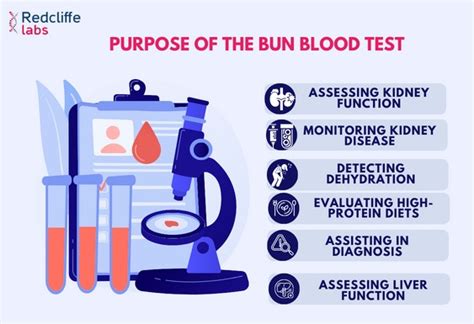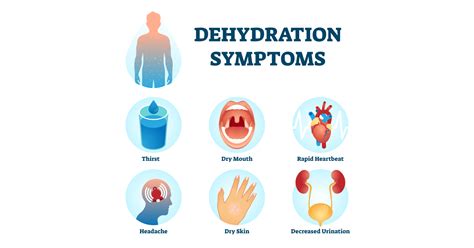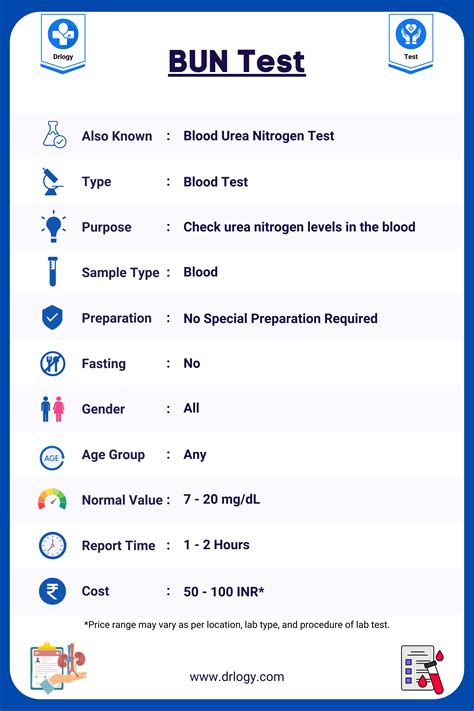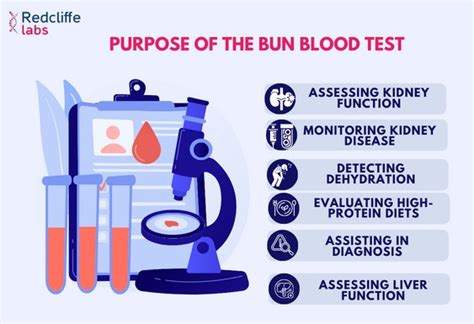Intro
Understand Bun lab test meaning and its significance in medical diagnosis, including blood urea nitrogen levels, kidney function, and related health conditions like dehydration and renal disease.
The bun lab test, also known as the blood urea nitrogen test, is a medical test used to measure the levels of urea in the blood. Urea is a waste product produced by the body's metabolic processes, and it is normally removed from the blood by the kidneys. The bun lab test is an important diagnostic tool used to assess kidney function and detect potential kidney problems. In this article, we will delve into the details of the bun lab test, its meaning, and its significance in medical diagnosis.
The bun lab test is a simple and non-invasive test that involves taking a blood sample from a patient. The blood sample is then sent to a laboratory for analysis, where the levels of urea are measured. The test is usually performed as part of a routine medical checkup or when a patient is experiencing symptoms such as fatigue, swelling, or difficulty urinating. The results of the bun lab test can provide valuable information about a patient's kidney function and help doctors diagnose potential kidney problems.
The kidneys play a crucial role in removing waste products, including urea, from the blood. When the kidneys are functioning properly, they filter the blood and remove excess urea, which is then excreted in the urine. However, when the kidneys are not functioning properly, urea can build up in the blood, leading to a range of health problems. The bun lab test can help doctors detect potential kidney problems, such as kidney disease or kidney failure, by measuring the levels of urea in the blood.
Understanding Bun Lab Test Results

The results of the bun lab test are typically reported in units of milligrams per deciliter (mg/dL). The normal range for bun lab test results varies depending on the laboratory and the individual's age and health status. Generally, a normal bun lab test result is between 6 and 24 mg/dL. However, the normal range may vary slightly depending on the laboratory and the individual's specific health status. If the results of the bun lab test are higher than the normal range, it may indicate kidney problems or other health issues.
What Do High Bun Lab Test Results Mean?
High bun lab test results can indicate a range of health problems, including kidney disease, kidney failure, and dehydration. When the kidneys are not functioning properly, they may not be able to remove excess urea from the blood, leading to high bun lab test results. High bun lab test results can also be caused by other factors, such as a high-protein diet, certain medications, and underlying medical conditions. If the results of the bun lab test are high, the doctor may order additional tests to determine the underlying cause of the abnormal result.Bun Lab Test and Kidney Function

The bun lab test is an important tool for assessing kidney function. The kidneys play a crucial role in removing waste products, including urea, from the blood. When the kidneys are functioning properly, they filter the blood and remove excess urea, which is then excreted in the urine. However, when the kidneys are not functioning properly, urea can build up in the blood, leading to high bun lab test results. The bun lab test can help doctors detect potential kidney problems, such as kidney disease or kidney failure, by measuring the levels of urea in the blood.
How Does the Bun Lab Test Help Diagnose Kidney Problems?
The bun lab test can help diagnose kidney problems by measuring the levels of urea in the blood. When the kidneys are not functioning properly, they may not be able to remove excess urea from the blood, leading to high bun lab test results. The bun lab test can also help doctors monitor the progression of kidney disease and adjust treatment plans accordingly. In addition, the bun lab test can help doctors diagnose other health problems, such as dehydration and heart failure, which can also affect kidney function.Bun Lab Test and Dehydration

Dehydration is a common cause of high bun lab test results. When the body is dehydrated, the kidneys may not be able to remove excess urea from the blood, leading to high bun lab test results. Dehydration can be caused by a range of factors, including inadequate fluid intake, excessive sweating, and certain medical conditions. If the results of the bun lab test are high, the doctor may recommend increasing fluid intake to help rehydrate the body and improve kidney function.
How Does Dehydration Affect Bun Lab Test Results?
Dehydration can affect bun lab test results by causing the kidneys to concentrate the urine and reduce urine output. When the kidneys are not able to remove excess urea from the blood, it can lead to high bun lab test results. Dehydration can also cause the blood to become more concentrated, which can lead to high bun lab test results. If the results of the bun lab test are high, the doctor may recommend increasing fluid intake to help rehydrate the body and improve kidney function.Bun Lab Test and Heart Failure

Heart failure is a condition in which the heart is not able to pump enough blood to meet the body's needs. Heart failure can cause a range of symptoms, including fatigue, swelling, and shortness of breath. The bun lab test can help diagnose heart failure by measuring the levels of urea in the blood. When the heart is not pumping enough blood, the kidneys may not be able to remove excess urea from the blood, leading to high bun lab test results.
How Does the Bun Lab Test Help Diagnose Heart Failure?
The bun lab test can help diagnose heart failure by measuring the levels of urea in the blood. When the heart is not pumping enough blood, the kidneys may not be able to remove excess urea from the blood, leading to high bun lab test results. The bun lab test can also help doctors monitor the progression of heart failure and adjust treatment plans accordingly. In addition, the bun lab test can help doctors diagnose other health problems, such as kidney disease and dehydration, which can also affect heart function.Bun Lab Test Preparation

The bun lab test requires minimal preparation. Patients are typically asked to fast for 8-12 hours before the test to ensure accurate results. Patients should also avoid consuming foods that are high in protein, as this can affect the results of the test. In addition, patients should inform their doctor of any medications they are taking, as some medications can affect the results of the test.
What to Expect During the Bun Lab Test
The bun lab test is a simple and non-invasive test that involves taking a blood sample from a patient. The blood sample is then sent to a laboratory for analysis, where the levels of urea are measured. The test is usually performed in a doctor's office or hospital and takes only a few minutes to complete. Patients may feel a slight pinch or stinging sensation when the blood sample is taken, but this is usually mild and temporary.Bun Lab Test Risks and Complications

The bun lab test is a safe and non-invasive test that carries minimal risks and complications. However, as with any medical test, there are some potential risks and complications to be aware of. These include bleeding, bruising, and infection at the site where the blood sample is taken. In rare cases, the test may cause an allergic reaction or other adverse effects.
How to Reduce the Risks and Complications of the Bun Lab Test
To reduce the risks and complications of the bun lab test, patients should inform their doctor of any medications they are taking and any medical conditions they have. Patients should also follow the instructions provided by their doctor and laboratory staff to ensure accurate results. In addition, patients should report any symptoms or concerns they have to their doctor, such as bleeding, bruising, or infection at the site where the blood sample is taken.What is the bun lab test used for?
+The bun lab test is used to measure the levels of urea in the blood and assess kidney function.
What are the normal ranges for bun lab test results?
+The normal ranges for bun lab test results vary depending on the laboratory and the individual's age and health status, but generally range from 6 to 24 mg/dL.
What do high bun lab test results mean?
+High bun lab test results can indicate kidney problems, dehydration, or other health issues.
In summary, the bun lab test is an important diagnostic tool used to assess kidney function and detect potential kidney problems. The test measures the levels of urea in the blood and can help doctors diagnose a range of health issues, including kidney disease, dehydration, and heart failure. By understanding the meaning and significance of the bun lab test, patients can take an active role in their healthcare and work with their doctor to manage any potential health problems. If you have any questions or concerns about the bun lab test, be sure to speak with your doctor or healthcare provider. Share this article with others who may be interested in learning more about the bun lab test, and don't hesitate to comment below with any questions or comments you may have.
